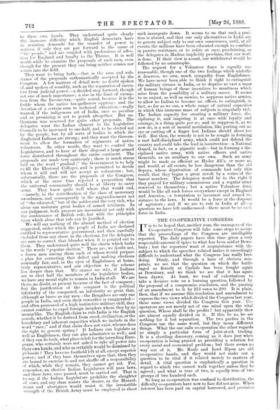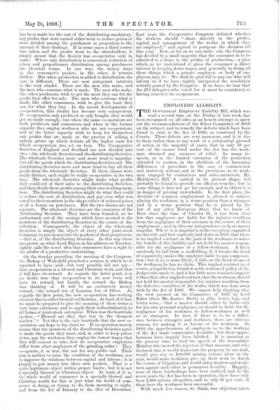is to be hoped that, another year, the managers of
the has been made for the cost of the distributing machinery, any profits that were earned either went to reduce prices or were divided among the purchasers in proportion to the amount of their dealings. If in some cases a third course was taken, and the profits went to the shareholders, it simply meant that the Society was co-operative only in name. Where only distribution is concerned, reduction of prices and proportionate distribution among purchasers are identical terms. In one way, the money stays in the consumer's pocket ; in the other, it returns thither. But when production is added to distribution, the case is different. There are now antagonist interests in the very citadel. There are the men who make, and the men who consume what is made. The men who make, like other producers, wish to get the most they can for the goods they offer for sale. The men who consume what is made, like other consumers, wish to give the least they can for what they buy. In the recent developments of co-operation, this rivalry has become very conspicuous. If co-operators only produced or only bought, they would get on easily enough ; but when the same co-operators are both producers and consumers, and when in the former capacity they employ workmen who are not co-operators, and in the latter capacity wish to keep for themselves any profits that are made in the process of selling, a system grows up which defeats all the higher ends for which co-operation was set on foot. The Co-operative Societies of England and Scotland are now divided into two,—the wholesale Societies and the distributing Societies. The wholesale Societies more and more tend to manufac- ture all the goods which the distributing Societies sell. The distributing Societies more and more tend to buy all their goods from the wholesale Societies. If these classes were really distinct, each might be really co-operative in its own way. The wholesale Societies might make what profits they could out of their sales to the distributing Societies, and then divide these profits among their own working mem- bers. The distributing Societies might do what they could to reduce the cost of distribution, and pay over what was saved to their members in the shape either of reduced prices or of a bonus on purchases. But the two classes are not separate. The wholesale Societies are the creatures of the distributing Societies. They have been founded, as we understand, out of the savings which have accrued to the members of the distributing Societies in the course of dis- tribution. Consequently, the object of the wholesale Societies is simply the object of every other joint-stock Company, to put money into the pockets of their proprietors, —that is, of the distributing Societies. In this way there has grown up what Lord Ripon, in his address on Tuesday, rightly calls the novel idea, that consumers have a right to the profits of a productive undertaking.
On the Sunday preceding the meeting of the Congress, the Bishop of Wakefield preached a sermon in which he is reported to have said—but very possibly did not say— that co-operation is a blessed and Christian work, and that it will have its reward. As regards the latter point, it is no doubt true that co-operation in its new form will have its reward, but hardly the reward the Bishop was thinking of. It will be an exclusively money reward,—the reward not of Lazarus, but of Dives. As regards the first point, the new co-operation has nothing about it that is either blessed or Christian. At least, if it has, we must be prepared to give the meaning of these terms a very large extension, and to apply them indiscriminately to all forms of joint-stock enterprise. When was the beatitude spoken,—" Blessed are they that buy in the cheapest market" ? Yet this is the only beatitude that the new co- operation can hope to lay claim to. If co-operation merely means that the members of the distributing Societies agree to make the goods they want, and, in order to keep prices down, pay the workmen they employ the lowest wages that they will consent to take, how do co-operative employers differ from other employers of the grinding order ? They co-operate, it is true, but not for any public end. Their aim is neither to raise the condition of the workman, nor to improve the relations between capital and labour ; it is limply to put money into their own pockets. That is a quite legitimate object within proper limits ; but it is not a specially blessed or Christian object. At least, if it is, the whole world of commerce is a specially blessed and Christian world, for this is just what the world of com- merce is doing, or trying to do, from morning to night, and from the 1st of January to the 31st of December. Last year, the Co-operative Congress debated whether- the workers should " share directly in the profits, capital, and management of the works in which they are employed ;" and agreed to postpone the decision till this year. Now, so far as we can make out, the Congress has decided by a small majority that the consumer is to be admitted to a share in the profits of production,—a plan. which, as we understand it, gives the consumer a direct interest in keeping down wages, and generally in doing all those things which a private employer, or body of em- ployers, may do. We shall be grateful to any one who will inform us if we have rightly interpreted the resolution actually passed by the Congress. If we have, we fear that the 213 delegates who voted for it must be considered as having ceased to be co-operators.



































 Previous page
Previous page